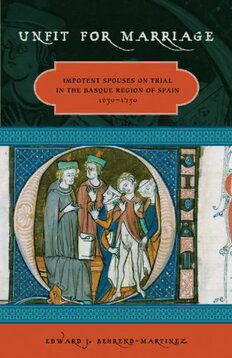
Unfit For Marriage: Impotent Spouses On Trial In The Basque Region Of Spain, 1650-1750 (The Basque Series) PDF
225 Pages·2007·1.966 MB·English
Most books are stored in the elastic cloud where traffic is expensive. For this reason, we have a limit on daily download.
Preview Unfit For Marriage: Impotent Spouses On Trial In The Basque Region Of Spain, 1650-1750 (The Basque Series)
Description:
In early modern Europe the sacrament of matrimony represented a life-long commitment, and the Catholic Church accepted few grounds for the dissolution of an unhappy marriage. One of these was an unconsummated marriage owing to the sexual impotency of one of the partners. Even then, an annulment was granted only after a Church court had conducted a lengthy investigation of the case, soliciting testimony from numerous witnesses as well as from the aggrieved couple, and had subjected the allegedly impotent spouse (and sometimes both spouses) to an intimate physical examination. Historian Edward J. Behrend-Mart?nez studied the transcripts of eighty-three impotency trials conducted by the ecclesiastical court of the Spanish diocese of Calahorra in La Rioja--an area incorporating both Basque and Castilian populations and including urban and rural parishes. From these records, he produced a detailed account of private life and public sexuality in these early years of the modern era. The transcripts provide insights into the dynamics of daily marital life and the role that property, gender, and personal preference played in marriage. They also reveal information about medical knowledge at the time and about contemporary understanding of the physiology and psychology of sex. Unfit for Marriage is the first study in English to address the proceedings of a Spanish ecclesiastical court and is a vivid portrait of marriage and marital sex in early modern Europe. It is essential reading to anyone interested in social history, gender studies, canon law, legal history, sexuality, and the history of divorce in Western Europe.
See more
The list of books you might like
Most books are stored in the elastic cloud where traffic is expensive. For this reason, we have a limit on daily download.
